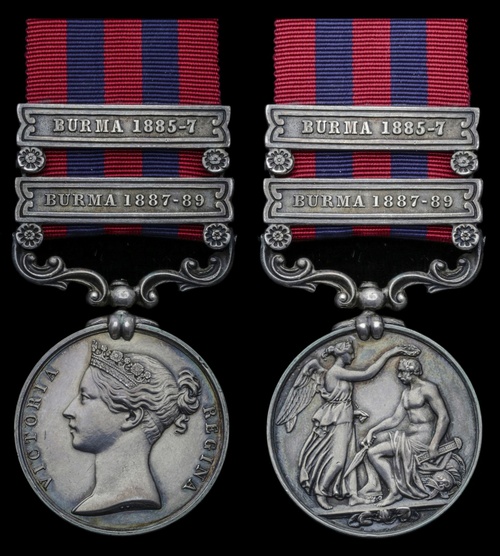
Auction: 20002 - Orders, Decorations, Medals & Space Exploration
Lot: 45
(x) The fine India General Service Medal awarded to Major W. A. Cuppage, 5th Bengal Infantry, Indian Army, late Liverpool Regiment, who was severely wounded in Burma in 1887 and was commended whilst on Plague Duty at Bombay in 1900
India General Service 1854-95, 2 clasps, Burma 1887-89, Burma 1885-7 (Lieut. W. A. Cuppage 5th. Bl. Infy.), nearly extremely fine
William Adam Cuppage was born on 26 June 1860 at Fermoy, Ireland, the son of John Macdonald Cuppage and Elizabeth Geraldine De Courcy Collis. Educated at the Royal Military College, Sandhurst, from January 1880-21 January 1881, Cuppage was appointed to a commission without purchase in the 99th Foot, being promoted Lieutenant in the 2nd Battalion, Liverpool Regiment on 1 July 1881. Advanced Captain in the 5th Bengal Light Infantry on 22 January 1892 and Major on 22 January 1901, he thus carved out a highly successful career in the British and Indian Army.
It was whilst in India that his talents as a linguist began to come to the fore; between 1882 and 1895 he achieved the Higher Standard in Hindustani and Persian, Elementary Standard in Burmese and Lower Standard in Pashtu and Urdu. He also passed courses in French and Russian, qualifying as an interpreter in the latter. His service record further notes his competence as a mounted infantry officer, and his qualifying to instruct a company in musketry.
According to the War Services of Officers of the Army, Cuppage was severely wounded whilst on the Burmese Expedition of 1886-7. His service record notes that he was engaged upon the march to Upper Burmah at this time, taking part in the Battle of Youngma Hill on 5 June 1887. His wound resulted in the award of a year's salary and a few months later, on 18 October 1887, he was furloughed to Europe on a medical certificate. One can only speculate, but it likely that his wound failed to heal in the hot Burmese climate, possibly becoming infected and necessitating specialist medical intervention at home.
Somewhat remarkably, following a period of extended leave without pay, he was next posted to the cold climates of Russia from 7 December 1888-10 October 1889, before transferring back to India. Posted to Lucknow, Allahabad, Simla and Alipore, Cuppage witnessed steady promotion as he settled in to family life with a young wife and two children. However, his career was not quite over yet; on 23 June 1900, he and fellow officers of the 5th Bengal Light Infantry received a telegram from Bengal Command directing them and their men to the City of Bombay 'on plague duty'. His C.O. was somewhat less than keen to place Cuppage in harm's way:
'Could spare Watling (Captain A.T. Watling, I.S.C.), most difficult to spare Cuppage.'
Having survived the outbreak caused by poor sanitation and a rapidly increasing population, Cuppage and his wife determined to return to Ireland after a short spell with the 48th Pioneers as second-in-command (The Army and Navy Gazette, 24 October 1908, refers). He died on 19 October 1908 at Cork, leaving effects to the value of £2222. 6s. 3d., to his wife, Caroline Isabel Cuppage whom he married at Lucknow, India, on 28 January 1891. Alas, following such an eventful life, the circumstances of his death later attracted the attention of The Leinster Reporter on 31 October 1908:
'At the inquest on Major William Adam Cuppage, who was found drowned in the Blackwater, near Fermoy, Mrs Cuppage stated that he was subject to heart spasms. A verdict of death from natural causes was recorded. Major Cuppage served in the Burmese Expedition in 1886 to 1887. He was severely wounded in the Shan Hills, and was mentioned in despatches.'
Sold together with copied service record, commission certificate, and private research.
Subject to 5% tax on Hammer Price in addition to 20% VAT on Buyer’s Premium.
Sold for
£380
Starting price
£280




